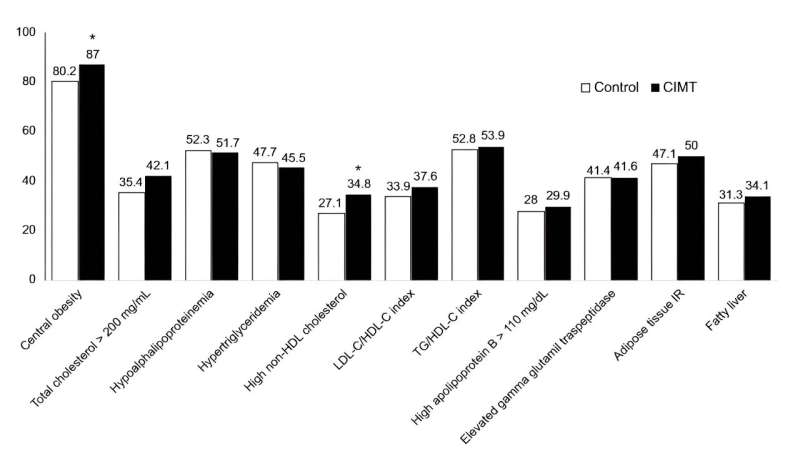This article has been reviewed according to Science X's editorial process and policies. Editors have highlighted the following attributes while ensuring the content's credibility:
fact-checked
trusted source
proofread
Genetic keys to cardiovascular health: A study from Mexico City

In Mexico City, researchers at the Instituto Nacional de Cardiología Ignacio Chávez have studied genetic underpinnings of one of the most pressing public health challenges of our times: cardiovascular disease (CVD).
Led by Dr. Rosalinda Posadas-Sánchez and her team, the novel study titled "Increased carotid intima-media thickness and cardiometabolic risk factors are associated with IL-6 gene polymorphisms in Mexican individuals: The Genetics of Atherosclerotic Disease Mexican study," published in Biomolecules and Biomedicine, marks a significant leap forward in our understanding of the complex interplay between genetics and cardiovascular health.
The heart of the matter
Cardiovascular disease, an umbrella term encompassing conditions such as coronary artery disease (CAD) and stroke, remains a leading cause of death globally. Atherosclerosis, characterized by the thickening of arterial walls due to the accumulation of fatty deposits, lies at the heart of many CVDs, silently escalating the risk of heart attacks and strokes.
While factors like obesity, hypertension, and smoking are known contributors, they fall short of fully explaining the variability in disease prevalence and severity observed among individuals. This disparity hints at a deeper, more intricate story woven into our genetic fabric.
Enter interleukin 6 (IL-6), a cytokine playing a pivotal role in inflammation and immune response, now implicated in the development of atherosclerosis. The study meticulously examined three polymorphisms within the IL-6 gene (rs1800795, rs2069827, and rs1800796) in a cohort of 1,084 Mexican individuals, delineating a clear genetic predisposition to increased carotid intima-media thickness (CIMT), a recognized marker of atherosclerosis.
"Understanding the genetic architecture of atherosclerosis is crucial for early detection and prevention," stated Dr. Posadas-Sánchez, emphasizing the study's ambition. "Our findings highlight the significant role of IL-6 gene polymorphisms in cardiovascular risk, offering new perspectives on individual susceptibility to this pervasive disease."
The study's methodology was as robust as its objectives, involving a comprehensive analysis of IL-6 polymorphisms and their association with increased CIMT and cardiometabolic risk factors. Participants were selected based on CIMT measurements, with those exhibiting CIMT in the 75th percentile or above classified as having increased atherosclerotic risk. This clear demarcation allowed for a nuanced exploration of the genetic factors contributing to cardiovascular disease, beyond the traditional risk factors.
"The rs1800796 polymorphism, in particular, emerged as a significant predictor of increased CIMT, underscoring the genetic dimensions of cardiovascular risk," noted Dr. Ángel Rene López-Uribe, highlighting a key discovery. Moreover, the study showed how specific haplotypes, or combinations of IL-6 gene variations, influenced the risk of elevated CIMT, painting a complex picture of genetic risk factors that transcend simple causality.
In dissecting the relationship between IL-6 polymorphisms and cardiometabolic risk factors, the research gave insight into the protective effects of certain genetic variations against central obesity, hypoalphalipoproteinemia, and insulin resistance. "These insights not only deepen our understanding of cardiovascular genetics but also open the way for personalized medicine approaches in managing and preventing heart disease," explained Dr. Julian Ramírez-Bello, reflecting on the study's broader implications.
The discussion section of the paper weaves together the intricate findings, situating them within the broader context of global cardiovascular research. It addresses the crucial role of inflammation, mediated by cytokines like IL-6, in the pathogenesis of atherosclerosis, offering a compelling narrative that bridges genetic predispositions with clinical outcomes.
"Our research underscores the complex interplay between genetics and environment in cardiovascular health," remarked Dr. Gilberto Vargas-Alarcón, the study's senior author. "By shedding light on the genetic variants associated with increased risk, we can better understand the mechanisms driving cardiovascular disease and ultimately improve strategies for prevention and treatment."
The study's conclusion is both a reflection on the journey undertaken and a forward-looking statement on the path ahead. It emphasizes the potential of genetic markers, particularly IL-6 polymorphisms, to serve as valuable tools in identifying individuals at heightened risk for cardiovascular disease. Yet, it also calls for further research, acknowledging the intricate dance of genetic and environmental factors in shaping health outcomes.
In closing, Dr. Posadas-Sánchez articulates the study's core message. "Our findings are a testament to the power of genetic research in unraveling the complexities of cardiovascular disease. As we continue to explore the genetic frontiers of health and disease, we move closer to a future where personalized medicine can transform lives."
More information: Rosalinda Posadas-Sánchez et al, Increased carotid intima-media thickness and cardiometabolic risk factors are associated with IL-6 gene polymorphisms in Mexican individuals: The GEA Mexican study, Biomolecules and Biomedicine (2023). DOI: 10.17305/bb.2023.9495


















